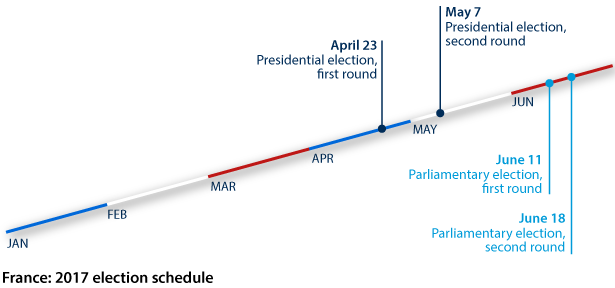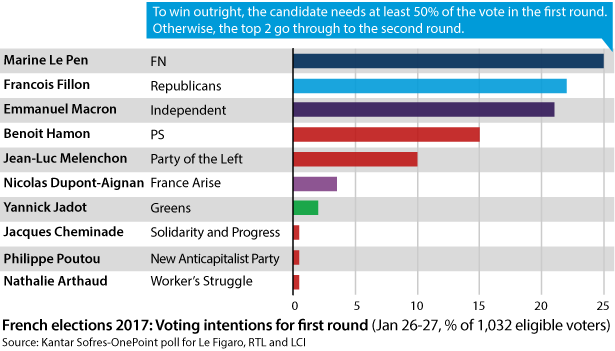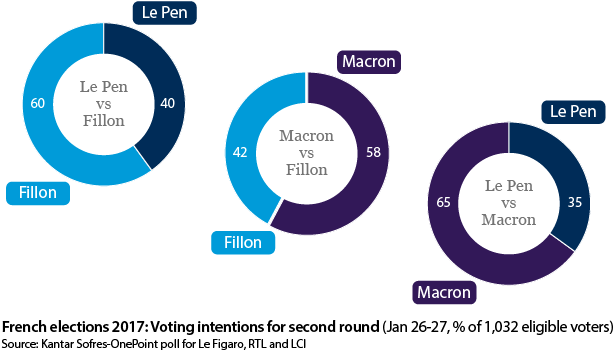French parliament, not president, may guide next steps
Both Le Pen and Macron would struggle to implement their agendas for lack of support in the legislature
Centre-right candidate Francois Fillon yesterday said he was the victim of a “professional plot” intended to destroy his presidential bid. He is weakened by allegations that his wife Penelope and two of their children were employed for years by him, which is legal, and received nearly 1 million euros (1.08 million dollars) without doing any work. Should he withdraw, centrist independent Emmanuel Macron has a far greater likelihood of winning -- despite having no party and (as yet) offering no specific policies.
What next
Far-right National Front (FN) leader Marine Le Pen will most likely advance to the second round and then lose, but even if she were to win, her party’s nearly non-existent representation in the legislature would almost certainly block her more radical plans. Macron is the more likely ‘unconventional’ winner, particularly if Fillon withdraws or fails to resolve ‘Penelopegate’. However, Macron too would face a challenge in realising his policies owing to his status as an independent, whereas a Fillon victory would likely be accompanied by legislative strengthening for his party, thus giving him the best chance to achieve his agenda.
Subsidiary Impacts
- The psychological impact of a Le Pen victory on France, Europe and global markets would be seismic.
- Le Pen’s dispute with the European Parliament over misuse of funds is unlikely to damage her election prospects.
- French ten-year government-bond yields are likely to remain high and even rise in the run-up to the second round.
- The Socialists face a period of political wilderness and even a split, with one group aligning with the Greens and the other with Macron.
- If US President Donald Trump continues to create uncertainty, French voters may prefer political stability and the EU over populism.
Analysis
This election is one of the most unpredictable in the history of the Fifth Republic, having already featured:
- the decision of Socialist President Francois Hollande not to seek re-election due to his toxic popularity level (4%);
- polls consistently showing that Le Pen will win the first round and lose the second;
- a graft scandal that now threatens Fillon's chances and could even see him withdraw from the race; and
- the rise of Macron, a politician with a movement but no party and, so far, no clearly defined policies (see FRANCE: Macron could change political landscape - July 21, 2016).
Assumptions
Several assumptions must therefore be re-examined:
There will be a second round
There is only a second round if no candidate wins an outright majority in the first round on April 23.
This has never happened in the Fifth Republic and at the moment, no candidate comes even close to having a majority. Still, there is an outside scenario where Macron could scrape a first-round victory.
21%
Level of support for Macron in the first round, according to recent polls
If Fillon, currently polling 22% of first-round voting intentions, were to be placed under formal investigation and withdraw, his supporters would likely split between Le Pen (25%) and Macron (21%).
However, if the majority of Fillon's support went to Macron, and other leftist and smaller parties supported him as well, Macron could just manage a majority in the first round.
By contrast, even if all of Fillon's supporters voted for Le Pen, she would still fail to gather a first-round majority.
Le Pen wins, then loses
In the most likely scenario, no candidate wins an outright majority and thus the top two candidates proceed to the second round on May 7.
Le Pen has consistently come top of the opinion polls and a recent survey showed her winning 25% of the first-round vote. It also suggested that she would lose in the second round -- to Macron (by 65% to 35%) more than to Fillon (60% to 40%).
Those are significant defeats and it is difficult to imagine what she could do broaden her appeal.
However, her opponents could help improve her chances.
Even if Penelopegate is still unresolved by the election, Fillon could stay in the race, somewhat diminished but ultimately still supported by voters who prefer his conservativism to Le Pen's. This would still allow him to win, but by a smaller margin.
Alternatively, should Macron's eventual policy unveiling fail to impress, or were he to encounter a scandal, he might not win anywhere near his expected level of support.
Le Pen would still lose the second round in either of these scenarios, but by a smaller gap.
Le Pen wins both rounds
The vast majority of polls dismiss this scenario outright.
However, last year's Brexit vote in the United Kingdom and Trump's victory in the 2016 US presidential election suggest that 'impossible' scenarios must be considered, and seriously.
Brexit and Trump suggest that 'impossible' scenarios, such as a Le Pen win, must be considered
The danger of assuming Le Pen's defeat in the second round is that this assumption is linked to the defeat of her father, Jean-Marie Le Pen, in the 2002 presidential election, when voters of all political colours united to elect the incumbent President Jacques Chirac.
However, the daughter is not the father: Marine Le Pen has spent years 'sanitising' the party of its more overt anti-Semitism, Islamophobia and xenophobia.
In recent years, she has aligned herself with the Eurosceptic movement, calling for France to leave the euro and Schengen in a Gallic version of the 'take back control' movement seen in the United Kingdom and United States.
Her party has built a track record of victories in recent elections at the levels of mayor, department, region (where it was only defeated by tactical voting among other supporters) and in the European Parliament.
Le Pen's weaknesses
Meanwhile, several high-profile terrorist attacks in the past few years have elevated security and immigration among voters' concerns (see FRANCE: Security policy will focus on symbolism - August 25, 2016).
It is too simplistic to suggest that the FN would benefit if another attack were to occur before the election -- Le Pen or the party could just as easily alienate voters, or one of her opponents could better reassure them.
However, she has long linked security and immigration, two issues that resonate with French voters (see FRANCE: Migration policy will become more restrictive - September 27, 2016).
Yet she is also weak:
Legislature
The FN has a tiny representation in the legislature and this is unlikely to improve much, if at all, when the legislative elections are held in June.
Economic policy
Her promise to hold a referendum to leave the euro within six months of being elected would require changes to French law and thus support in the legislature that she does not have.
Her intention to allow money printing, currency intervention and import taxes would also likely be rejected (see FRANCE: Economy will fail to accelerate in 2017 - January 4, 2017).
Russia
The FN struggles perennially with funding, especially because it is shunned by French banks.
This has led to Le Pen seeking and receiving loans from Russian banks, with inevitable links, in spirit if not in deed, to Russian President Vladimir Putin.
Fillon-Macron contest
The most unlikely scenario is one in which Le Pen does not get through the first round and Fillon and Macron do, in which case polls suggest that Macron would win with 58%.
However, the aforementioned caveats would apply even here -- victory is by no means inevitable for Macron in any scenario and any path to it is riddled with pitfalls.



